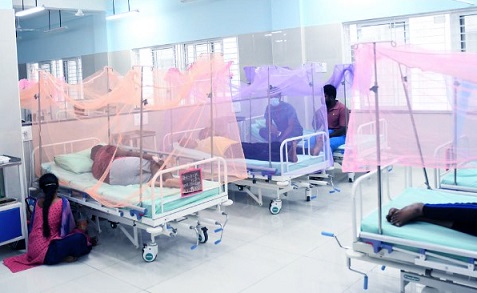New concerns in Pune, India as Chikungunya survivors face long-term health issues
Nikhil Prasad Fact checked by:Thailand Medical News Team Oct 25, 2024 5 months, 2 weeks, 5 days, 5 hours, 25 minutes ago
Medical News: Neurological and Cardiac Complications Emerging in a Small Group.
Pune is recovering from one of the most severe chikungunya outbreaks in recent times, but new concerns have surfaced as doctors report patients facing serious complications even after recovering from the initial infection. Typically, one of the post-effects of chikungunya infections is joint pains.
https://www.nature.com/articles/nrrheum.2017.223
However, doctors in Pune are witnessing a growing number of people experiencing more alarming issues like neurological and cardiac problems.
 New concerns in Pune, India as Chikungunya survivors face long-term health issues
New concerns in Pune, India as Chikungunya survivors face long-term health issues
Doctors in the city have pointed out that while such complications are not widespread, the sheer scale of this year’s outbreak has left a noticeable number of patients dealing with long-term health problems. A significant worry is for those who developed neurological complications during their chikungunya infection, and these individuals are now facing slow and difficult recoveries.
Neurological Problems Raise Alarms
Some patients have developed a condition known as Guillain-Barré Syndrome (GBS), a rare but serious disorder that affects the body’s peripheral nerves. According to Dr. Ameet Dravid, an infectious disease expert at Noble Hospital, while many patients with GBS see improvements in upper limb strength, they often struggle with lower limb weakness, which leaves some dependent on wheelchairs for mobility. "The neuro complications we’re observing are part of a broad range of post-viral complications caused by this year’s chikungunya outbreak," he said.
In addition to neurological symptoms, Dr. Dravid mentioned that some patients are experiencing gastrointestinal issues, including severe diarrhea that continues even after the infection has been cleared. Other patients have reported cardiac issues, such as irregular heart rhythms, which further complicates their recovery.
While severe complications like these affect less than 1% of all chikungunya cases, the massive scale of the 2024 outbreak means that many people now need specialized care and rehabilitation. This
Medical News report provides an in-depth look into the emerging health concerns post-chikungunya infection.
The Challenge of Long-term Recovery
Managing these post-infection complications is becoming a challenge for healthcare providers. Another infectious disease specialist at Sahyadri Hospitals, noted that even after clearing the initial infection, many patients continue to deal with a range of neurological issues. "We’re seeing patients who developed encephalitis during their chikungunya infection now needing extended care. They suffer from persistent headaches, focal neurological signs, and in some cases, EEG and MRI scans reveal abnormalities," he said.
Wha
t’s particularly concerning for doctors is the prolonged recovery time for these neurological problems. "In previous outbreaks, we did see post-viral complications, but this time they are appearing more prominently. Recovery from these issues is taking anywhere from three to six months, with symptoms like tingling, numbness, and neuritis-like problems," doctors in Pune are warning.
Some patients are finding it difficult to regain their pre-infection health and need ongoing support, including physiotherapy and specialized rehabilitation programs, to manage their symptoms and slowly return to their daily activities.
A Familiar Pattern in Chikungunya’s Aftermath
While the current outbreak has drawn attention to these severe post-recovery issues, infectious disease expert Dr. Raman Gaikwad emphasized that such problems are not entirely new. "We’ve seen similar complications in previous outbreaks, including the one Pune experienced back in 2006," he explained. "Some patients are likely to experience chronic symptoms, such as triggered arthritis or post-viral fatigue, that can last for months or even years. This has been consistent in almost every chikungunya outbreak we’ve studied."
However, Dr. Gaikwad also noted that this year's outbreak is larger than usual, contributing to the noticeable increase in post-infection complications. "Chikungunya tends to follow a cycle, with larger outbreaks occurring every 7 to 10 years, and we are currently in the midst of one such cycle," he said.
Despite the growing concerns, Dr. Gaikwad assured that chikungunya itself hasn’t changed fundamentally. What has changed is the advanced testing and diagnostic methods that allow doctors to identify and document a wider range of complications. "While it might seem like the disease is behaving differently, it’s important to remember that these complications have always been a potential consequence of chikungunya," he explained. "It’s our improved detection capabilities that are bringing these issues to light more than before."
Conclusion
The 2024 chikungunya outbreak has left an indelible mark on Pune’s healthcare system, as doctors now face the challenge of managing the long-term health issues arising in some survivors. Neurological and cardiac complications, while affecting a small percentage of those infected, are requiring extended care and rehabilitation. The longer-than-usual recovery periods, particularly for patients with Guillain-Barré Syndrome and encephalitis, are concerning for healthcare providers, who are working to provide support for these individuals.
Although the scale of the outbreak has increased the visibility of these complications, experts like Dr. Raman Gaikwad emphasize that such post-viral issues are not new and have been documented in previous chikungunya epidemics. Advances in medical technology have simply improved the detection of these conditions, helping doctors provide more targeted care. As Pune continues to recover from this outbreak, the focus will remain on helping patients overcome these complications and return to normal life.
For the latest on the Chikungunya outbreak in Pune, India, keep on logging to Thailand
Medical News.
Read Also:
https://www.thailandmedical.news/news/silico-study-reveals-potential-antiviral-properties-of-nyctanthes-arbor-tristis-linn-against-ebola-sars2-nipah-chikungunya-viruses
https://www.thailandmedical.news/news/breakthrough-research:-most-viral-disease-borne-by-mosquitoes--can-be-prevented-using-aldara-cream
